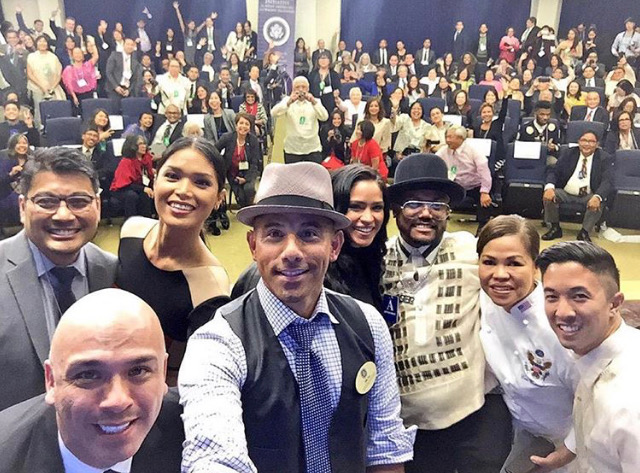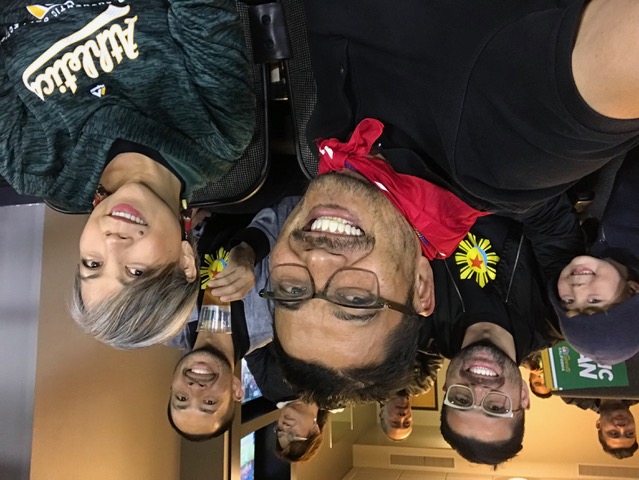SUMMARY
This is AI generated summarization, which may have errors. For context, always refer to the full article.
![[Only IN Hollywood] Ronnie del Carmen on leaving Pixar to direct Philippine lore-based Netflix film](https://www.rappler.com/tachyon/2021/04/Ronnie_Oct28.18_WDFM.jpeg)
Ronnie del Carmen, Oscar Best Original Screenplay nominee for Inside Out which he co-directed with Pete Docter, recently sat down with me to talk about leaving Pixar after two decades to direct a Netflix animated feature based on Philippine lore.
The Pixnoy (Pinoy who works at Pixar), who collaborated in various capacities on films including Up, Wall-E, Coco and Soul, in the renowned animation studio in Northern California, explained in our video conversation why he made the bold move to Netflix.
Before Pixar, the animator also worked at DreamWorks and Warner Bros.
“It’s attractive for a number of reasons,” began Ronnie, looking hip in his pandemic-times long hair, a scarf jauntily wrapped around his neck.
“One is that everybody has Netflix in their house. And you can see the kind of content that they have. Not only is it varied for a North American market – it’s varied for a global market.”
“You can find content there from all these other countries that you would never actually encounter. So if you’re feeling adventurous, you’re feeling like, I’m bored of just watching the same kind of stories you’re used to – you go get that variety in Netflix.”
“Netflix looked to me like, wow, so many different voices and points of view – there doesn’t seem to be a uniformity to them. They don’t have a standard brand style that they have to uphold.”
“Looking from afar, Netflix felt like a creator’s dream in terms of the scope and the range of things that you could explore.”
“And coming from having worked in studios since I started in animation, it felt like it was time for me to find out what would I make if I didn’t have the constraints of having to keep up the brand of a studio.”

“The other thing is that I have been growing older in the industry – as you can tell – and I’ve been impatient to tell stories that I have been wanting to tell. My own stories.”
“Like these stories that I grew up with. The older I get, the more it became crucial for me to get those stories out there because when am I going to get this shot?”
“Stories from my own culture is a huge part of what I am as a storyteller. Even though it’s not apparent, I do use that side of me to make the movies I’ve been part of. It’s hidden because the subject matter isn’t about my stories.”
“Most studios have output that has to please and relate to the most number of people. And should confuse very little to none. It’s good business. But that also means the stories are specific. And my culture is not widely encountered in entertainment. It’s kind of exotic and unusual to most people.”
“So I feel like I want to go where I could tell these stories, be encouraged and allowed to flourish and tell these stories as I see them being told.”
At 61, the Cavite, Philippines native whose family experienced financial setbacks and challenges when he was growing up, will finally get his well-deserved opportunity to jump from co-director to director.
“Being a co-director is quite the privilege because you’re like one step away from the tip of the spear,” Ronnie said. “And being a co-director to Pete Docter is quite an honor and a pleasure because we’re friends and we worked together many years.”
“When I got the shot, I felt very lucky but at the same time, it felt like the most natural thing to do to make a movie with Pete.”
“And I had a lot of latitude in making Inside Out. I influenced the storytelling in the course of the film being made.”
“But primarily, you’re helping Pete make his movie. I was involved in it and I contributed a great deal of my own story into it but the governing voice would be the director.”
It excites me that Ronnie’s project at Netflix will be the first Hollywood animated movie based on Philippine material – the country’s mythology and history. And the Pinoy himself is writing the story.
As someone who grew up in Pangasinan but spent summers reading Filipino comics in Cavite, where my mother was from, I am familiar with the rich storytelling tradition that Ronnie was raised in. It’s therefore not surprising that his brothers, Louie and Rick, are also accomplished animators.
“I grew up in the Philippines in a small town, Cavite City,” he pointed out. “I grew up in the 60s. There was not a lot of technology. The thing that I focused on was TV. I tended to look into the TV and be inspired by the stories that come out of it.”
“But if you’re a Filipino kid, growing up, you would find yourself outdoors one way or another. You would be playing and telling stories with your friends. Your friends would be telling you stories, and you would hear stories by the elders of the community sitting there in the corner having a snack.”
“When it’s typhoon season and the power is out, you’re all huddled together with a candle in the middle of the floor, and everyone tells ghost stories, creepy creature stories and all those things.”
“So those experiences, if you’re a Filipino kid growing up in that situation, that’s the kind of stories that got seared into your brain, and somehow you think that everybody understands that but not really.”
“Not everybody in the world has seen those stories the way that you’ve seen and experienced them. The other part of it is that growing up, I had very little knowledge of the history of the Philippines that wasn’t dictated to me by the textbooks.”

“The textbooks tend to have a very limited view. They seemed incomplete to me. By the time I got to thinking about the full scope of Philippine history, I was much older.”
“There’s a lot of history that is complicated and difficult to hear that usually gets left out of the conversation.”
“Pre-colonial stories were even harder to come by and you don’t quite get a complete picture in your head. Not very many of us actually do. I’m very fascinated in the stories about who our peoples were before our colonists arrived.”
“So I’m exploring all of those things. I don’t know to what degree I’m able to actually squeeze all of those in one story.”
“I want to infuse my own growing up stories, the stories I heard when I was growing up and the history that I’ve been learning and relearning things I’ve forgotten.”
Asked if there are any specific Philippine mythology stories that have always fascinated him, Ronnie answered, “As a kid, I remember a few of the scary ones. Everyone has their favorites. I’m still in the middle of developing. I hopefully can bring in a few of those entities that I like.”
“I remember being told that in order to cross through the jungle, the forest, you have to ask permission from the invisible little spirits on the ground so that they don’t mess with you. Because they might.”
“You’re paying respects to the spirits of the forest while you cross. We called them nuno [sa punso] (dwarf-like nature spirits).”
“When you cross through the forest – if you get lost and ask for directions, be careful who you listen to while you’re in the forest because it might be a trickster spirit who’s trying to get you even more lost.”
“I think one of the fixes for that is to wear your shirt inside out, like invert it and wear it so that somehow, the trickster’s spell won’t work on you. Those were the handful of stories that I retained. I’ve had to dive back into those things and learn more about them.”
“But I’m also fascinated by the various tribes that are in the Southern islands of the Philippines and the middle, as well as the North and their traditions of fabric, handicraft and tattoos, the codes of the warriors and the elders.”
“It just feels like those are fascinating characters. I don’t know how to fit all of them into one story but I am trying to see how I can weave as much of what I’m fascinated with into it.”
Ronnie confirmed that he plans to tap Filipino animators to help add authenticity to his story.
“It’s something that I would love to have. So I’m wondering how I can be very diligent in making sure that the voices are authentic, especially at this time of our lives.”
“It is the threshold that we must meet as filmmakers to be as authentic to the culture that I’m hoping to represent as I can.”
“I’m sure that there’s not one story or not one filmmaker who’s going to be able to honor everything about any culture. I’m always very terrified. I’m trying to do a good job with it but I’m in the beginning of it. So I don’t know yet how well I’m doing.”
Ronnie, who was honored as an outstanding alumnus of the University of Santo Tomas College of Fine Arts and Design in 2015, will also consult on other animated projects at Netflix.
“I’m kind of older in this journey of making animated features,” he replied when I asked him what he looks forward to in this other role.
“I have learned along the way. So far, I’ve been helping out and being a resource to anyone who wants to ask me my experience with various studios.”
“I’ve had a number of people who ask me, how did you do this? And when did you do that? All of those things. I just believe that animation studios are very collaborative communities.”
“Such that you are better for having other people work with you who aren’t directly part of your team, who can comment and improve your view of how you’re doing and what you’re doing. So I am very willing to actively participate in that collaborative community to help and be of service.”
Looking back, Ronnie reflected that it was a “monumental” personal decision to leave the animation studio that the late Steve Jobs co-founded.
The artist, who wrote several comic books and illustrated a children’s book and comic books by other authors, left Pixar last year but announced his move to Netflix only last month.
“It was, of course, monumental because I’ve stayed in the company for 20 years. It’s two decades of your life. So in a lot of ways, I identified with the studio and I still do because you don’t just leave a huge chunk of your life behind.”
“But at the same time, I feel that I needed a growth surge. To discover new things and that’s what the opportunity that Netflix presents. I felt like this was the right thing to do.”
“Any change that you do in your life will make you pause in the enormity of the choice but at the same time, you can’t help but answer the call of adventure. It has so much to offer, to step out, seek new opportunities and pursue different adventures.”
He shared his best memories of working in that studio in Emeryville, California.
“On a professional level, I learned a ton from being part of the community at Pixar. It was a very unique studio that has a very specific way of pursuing creative excellence. The camaraderie, the friends and filmmakers, the tight bond that I have with so many people there. They’re like your second family.”
“I am one of the elders of the Pixnoys, from the very beginning. It was so amazing to be part of the Filipino community in the studio.”
“You have a second Filipino family extended from your own blood relatives who you see and work with every day. We got so many opportunities to stand and represent our culture. And people celebrated with us.”
“That was so amazing but it was also fortifying. Even before all of the turmoil that has happened to our country and the world in the last handful of years, the Filipino community at Pixar is very prominent.”
“We were specifically Pixnoy, Filipinos at Pixar. So I’m very proud of my involvement. Very sad to leave them because it is like saying goodbye to your family.”
“Filipinos are seafarers of old. We like adventures away from the comforts of home so that we can discover and self-actualize. This has been happening for so many centuries and maybe we have it in our genetics to do so.”
“So that’s why, as much as it’s always seemingly terrifying to step out of your comfort level, adventure and gains in your life are never arrived at by being timid, staying on the shore. You have to go and take a very big ocean trip to actually get somewhere and do something magnificent, hopefully.”
Ronnie added that he also cherished his Pixar years on a personal level: “The filmmakers are my friends. They’re not just colleagues. There’s a tight knit group there that even though we’re like brothers and sisters who are competitive, we’re also very supportive of each other.”
“We want to make each other succeed. I’m hoping to bring a lot of that mindset wherever I go because it’s good learning and it’s a good way to live. It’s a good way to be a professional.”
On whether he and his wife, Theresa, whom he met in college and with whom he has two children, plan to relocate to Los Angeles where Netflix is based, Ronnie replied, “That’s to be determined at this point but whichever makes sense.”
“But I love being in a studio. I can’t wait to actually be in a studio setting, encounter colleagues and other pros and make movies.”
“It’s energizing when you’re making a movie and you’re surrounded by other people who are not only helping you make a movie but are making movies and series on their own. It galvanizes you to run with the pack.”
“My daughter’s there, working in the film business as an art director and involved in art departments and she has a place there. And we lived in Los Angeles for 10 years before moving to the Bay area. So it’s almost like just a hop there and a hop here. I could live in both parts of California.”
In parting, I asked Ronnie about the rise of anti-Asian racism and violent attacks in America.
“That’s just heartbreaking,” he said. “Every time you see it, you feel like no one actually cares. It feels like you’re on your own. Until there are those who speak up who aren’t part of the community, until outrage comes from the governing arm of our country, until people who have a voice that is going to be heard say that this is will not stand!”
“We should condemn those acts of violence against Asians. When you see people stand up and say that this is not okay, and this should end, it feels like finally the conversation is being had.”
“But it also means to me that we should always be able to speak up about this and not have any member of our community be taken down, hurt, injured or killed when they stand their truth. I hope that this is not only the beginning but it also becomes a mainstay in the conversations we have in the country.” – Rappler.com
Add a comment
How does this make you feel?

![[Only IN Hollywood] Meet cinema’s hottest new threesome: Zendaya, Josh O’Connor and Mike Faist](https://www.rappler.com/tachyon/2024/04/only-in-hollywood-challengers-thumbnail-scaled.jpg?resize=257%2C257&crop=591px%2C0px%2C1380px%2C1380px)



There are no comments yet. Add your comment to start the conversation.